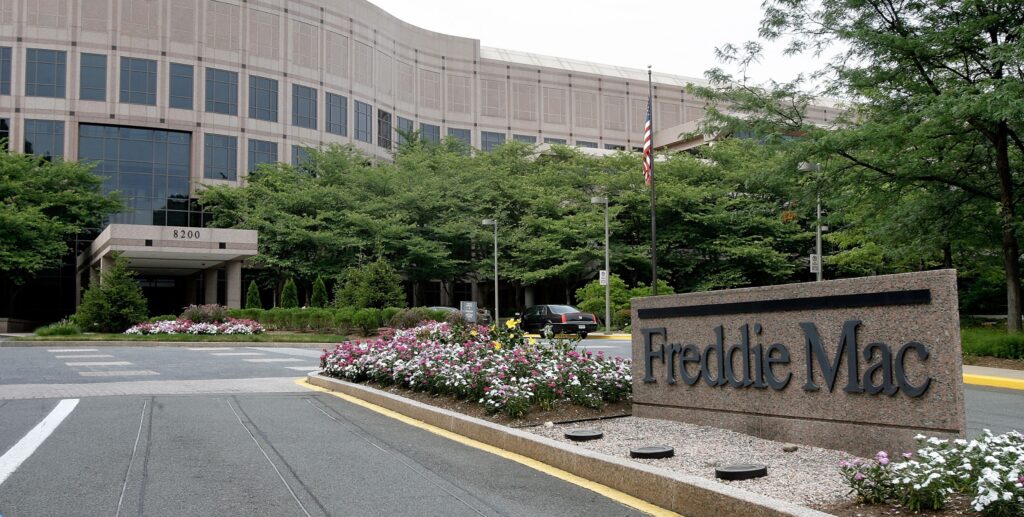In This Article
Trump has signaled that changes are on the way for Fannie Mae and Freddie Mac, the government-sponsored enterprises (GSEs) that guarantee home loans in order to increase access to homeownership. Once private companies, the GSEs were placed under conservatorship to prevent their collapse and stabilize the housing market during the financial crisis. That was intended to be a temporary solution, and the Trump administration is now exploring options for the future of Fannie and Freddie.
Shares of Fannie Mae soared after President Trump took office, with investors betting the administration would continue to pursue the end of conservatorship for the GSEs. The move would result in a windfall for shareholders. But Trump’s comments on Truth Social last week have led to uncertainty over the administration’s goals for the two government-sponsored enterprises, causing Fannie Mae stock to decline significantly over the last several days.
“I am working on TAKING THESE AMAZING COMPANIES PUBLIC, but I want to be clear, the U.S. Government will keep its implicit GUARANTEES, and I will stay strong in my position on overseeing them as president,” Trump announced.
The details remain a mystery. William Pulte, director of the Federal Housing Finance Agency, said the government is “studying all different options.” The possible paths for the two companies, which together guarantee about half the country’s outstanding mortgage debt, would result in different levels of government control and housing market outcomes, and none are without challenges and economic risk.
What Do Trump’s Comments Actually Mean?
The administration’s goals remain unclear. A 2019 Housing Reform Plan aimed at ending conservatorship failed during Trump’s first term, and investors initially responded to Trump’s announcement on Truth Social with enthusiasm, assuming the administration would pick up where it left off.
But Pulte’s comments to media outlets suggest a different plan. “The president has not said anything that he wants to end conservatorship. We’re studying actually potentially keeping it in conservatorship and taking it public,” he told CNBC.
It’s reasonable to expect some sort of reform, but a change to the status quo could take on many forms.
Public offering while maintaining conservatorship
Pulte’s comments suggest a plan to retain government control of the GSEs while using them to generate revenue. That would reflect the administration’s concerns about high mortgage rates and housing affordability. With an implied government guarantee, investors might continue to see GSE securities as low-risk investments, which would keep mortgage rates stable or even lower mortgage rates if Fannie and Freddie were able to raise more capital.
But that seems unlikely to work, according to JPMorgan strategists. “If the goal is to sell off the Treasury stake, potentially raising hundreds of billions of dollars to pay down the U.S. debt, we’d think that private investors would want the government’s involvement to be somewhat lighter than today,” they wrote. And maintaining conservatorship may not allow for the innovation, efficiency improvements, freedom from political influence, or reduced moral hazard that are central benefits in most arguments for reforming the GSEs.
And if the administration took action to scale back government involvement in the mortgage market to incentivize investors, even white maintaining conservatorship, the GSEs would either need to raise private capital to ensure liquidity in the face of reduced government support, charge higher fees to account for the increased risk, or purchase fewer mortgages. Any of those changes could result in higher mortgage rates—the very problem the administration hopes to prevent by retaining conservatorship.
Reform-recap-release
In order to release Fannie and Freddie from conservatorship, the GSEs would need to be sufficiently capitalized, and the Treasury would need to reduce its ownership interest. This process would be fraught with complex problems.
Current regulatory requirements dictate that Fannie and Freddie would each need an estimated $350 billion to qualify for exit. That would take 10 years for GSEs to acquire, according to estimates from NYU Furman Center. The FHFA would need to amend the requirement to accomplish an exit during Trump’s term.
Like JPMorgan strategists, Donald H. Layton, former CEO of Freddie Mac and senior visiting fellow at NYU Furman Center, wrote that it wouldn’t be possible for the GSEs to raise capital while under conservatorship. And because the Treasury would need to sell its shares over time to avoid price declines, exit from conservatorship would be a drawn-out process. Some experts believe that transferring holdings to a sovereign wealth fund might help transition to privatization with less risk.
Any perceived reduction in government guarantees or uncertainty about the future of Fannie and Freddie would also trigger investors to demand higher returns on GSE securities, which would impact mortgage rates.
Receivership and liquidation
A more extreme reform would involve placing the GSEs into receivership under the Housing and Economic Recovery Act, with the goal of liquidating the GSEs’ assets and revoking their charters. This would lead to an entirely private mortgage market without implicit government guarantees. This option receives support from some right-leaning think tanks like the Cato Institute, but it’s unlikely the administration will pursue receivership based on Trump’s comments.
Legislative reform of the housing system
The Trump administration could also consider writing new legislation that would change how the government regulates the secondary mortgage market. A legislative process would expand the options for reform—for example, the government could collect fees from the privatized companies and offer an explicit guarantee in return. That might raise mortgage rates, but it would also bring in revenue.
However, past attempts at legislative reform have failed. Political divisions and multiple stakeholder groups make the process difficult, and there’s a risk of market volatility during the transition to a new legislative model.
You might also like
Implications of Privatization
“A privatized Fannie or Freddie could mean more innovation in mortgage finance,” according to Danielle Hale, chief economist at Realtor.com, in an article. “But it would also mean higher mortgage rates for home shoppers.” It could have other implications as well.
Access to credit
Under conservatorship, the government mandates that the GSEs achieve certain affordable housing goals, and encourages Fannie and Freddie to use cross-subsidization to meet these obligations. That means borrowers with perfect credit pay slightly higher rates and fees to subsidize borrowers with low incomes and less-than-perfect credit, according to the GSE fee structure.
There is debate about the ethics of this practice, but it allows access to homeownership for more Americans. Privatization could lead to the end of cross-subsidization, which would reduce access to credit and increase mortgage rates for higher-risk borrowers. Affordable housing mandates also encourage lenders to issue loans in minority communities. Without these goals, we might see stricter credit and down payment requirements.
Competition in the mortgage market
Some experts believe that privatization could increase market competition and lead to deregulation in the long term, which could benefit homebuyers, but others are concerned about the impact on small lenders, especially in rural and minority communities. FHFA rules require the GSEs to use consistent pricing regardless of loan volume. That prevents large lenders from passing volume discounts on to homeowners, which would push small lenders that need to charge higher rates from the market. The end of conservatorship could mean the end of fair pricing, causing lending to dry up in certain communities.
Shareholder returns
Privatizing the GSEs would be a win for shareholders. No longer subject to affordable housing obligations, Fannie and Freddie would be free to focus on increasing profits. Since the GSEs would be accountable to shareholders and subject to reporting requirements, investor confidence in their management may grow.
Bill Ackman, a Trump ally whose hedge fund is the largest private holder of shares in Fannie Mae, is one of the more vocal supporters of ending conservatorship, and would stand to gain significant wealth from privatization. But the impact of profit-driven GSEs on the economy and homebuyers is more nuanced.
The GSEs might, for example, innovate their underwriting practices or offer new mortgage products in an effort to raise capital, which could improve access to credit, even though the companies wouldn’t be subject to FHFA requirements. But they might also invest in high-risk, high-reward mortgage products like subprime loans to increase profits, which could threaten the stability of the financial system in the event of a downturn—the situation that led to conservatorship in the first place. A strong regulatory framework post-conservatorship could help prevent a repeat of the financial crisis, however.
The Fundamental Question of the Role of Government
Aside from the practical considerations of reforming Fannie and Freddie, differences in political ideology regarding the role of government in the economy are powerful drivers in the debate over the future of the GSEs. To understand where both sides are coming from, it’s helpful to know the historical context of the argument, particularly the rise of conservatism in the decades before the financial crisis.
In the 1980s, many Americans were fed up with expensive liberal policies, which conservatives blamed for the stagflation of the 1970s, and the U.S. was primed for a shift toward free-market economics. Even the Federal Reserve under Chairman Paul Volcker, who served from 1979 through 1987, shifted its focus toward monetarism. An initial recession quickly gave way to a period of economic growth.
In the years leading up to the 2008 financial crisis, decades of history seemed to suggest the superiority of limiting government intervention in the financial system. The Fed allowed risky lending practices to run amok in part because Alan Greenspan, chair of the Fed from 1987 to 2006, strongly believed in the self-regulated free market, and his faith had not yet been tested.
“I was shocked, because I had been going for 40 years or more with very considerable evidence that it was working exceptionally well,” Greenspan told Congress of his economic ideology in 2008.
Greenspan’s views were influenced by the work of Adam Smith and Milton Friedman, but he failed to integrate the guidance of those thinkers with regard to the financial sector. Both Smith and Friedman supported government regulation in banking. History shows that an unregulated mortgage market does increase economic prosperity—until the market collapses.
There is still debate over the primary cause of the financial crisis. Some argue that affordable housing mandates pressured the GSEs to purchase subprime loans, and that government policy played a greater role in the financial crisis than insufficient regulation or private risk-taking. That would suggest that a release from conservatorship should be a priority for the Trump administration to prevent instability in the mortgage market.
But research from the Federal Reserve Bank of St. Louis suggests affordable housing goals had no impact on subprime mortgage originations or purchasing of subprime securities by Fannie and Freddie. Analysts on this side of the debate argue that a lack of regulatory oversight, combined with increased risk-taking due to the government’s backing, allowed the GSEs to fail. If that’s the case, the Trump administration should avoid privatization or carefully structure any reform within a regulatory framework that prevents instability in the mortgage market.
Proponents of privatization cite the risk to taxpayers inherent in government guarantees, but the precedent of a government bailout complicates their removal in the eyes of market participants, according to Bank of England economists. Authorities can say they’ll no longer interfere with the mortgage market, but the statement will be met with doubt. “…The rational response by market participants is to double their bets. This adds to the cost of future crises. And the larger these costs, the lower the credibility of ‘never again’ announcements. This is a doom loop,” wrote the economists in 2009.
Even if an entirely privatized system without government guarantee were possible, would it be advisable? Some analysts look to other countries for evidence that government guarantees aren’t necessary for optimal market performance. But the argument that European governments are less involved in mortgage markets is false—while they may not do so for securitization, European governments implicitly or explicitly guarantee mortgage loans in other ways. We don’t have a template for a successful financial system that doesn’t rely on government backing.
Trump’s comments acknowledge the importance of implicit government guarantees, which support not only stable mortgage rates in the short term, but also the stability of the financial system in the long term. While the administration is exploring all options, it’s likely the reform will maintain government guarantees to some degree.
How Would Reform Impact Real Estate Investors?
Reforming the GSEs would impact real estate investors in several ways, both positive and negative.
Mortgage rates: Privatization, or even reduced government regulation inside a conservatorship, may result in higher mortgage rates, especially for investment properties. However, it’s possible that borrowers with high incomes and perfect credit could see rates fall with the end of cross-subsidization.
Underwriting standards: A private mortgage market would likely mean more stringent credit and income requirements and larger down payment requirements, especially for multifamily loans. This could make it more difficult for investors to rapidly grow their portfolios.
Lending options: Ending conservatorship could allow nontraditional lending businesses to flourish. Private lenders might develop customized mortgage products designed to serve the needs of real estate investors, which may provide more flexibility, albeit at a higher cost.
Final Thoughts
At this stage in the Trump administration’s plan, the future of Fannie and Freddie remains uncertain. The outcome of any reform relies heavily on how the transition is structured and the regulatory framework left in place for the GSEs going forward, so it’s tough to champion any one idea without a detailed plan. But for better or for worse, a change to the status quo is likely to impact financing options for real estate investors.
























